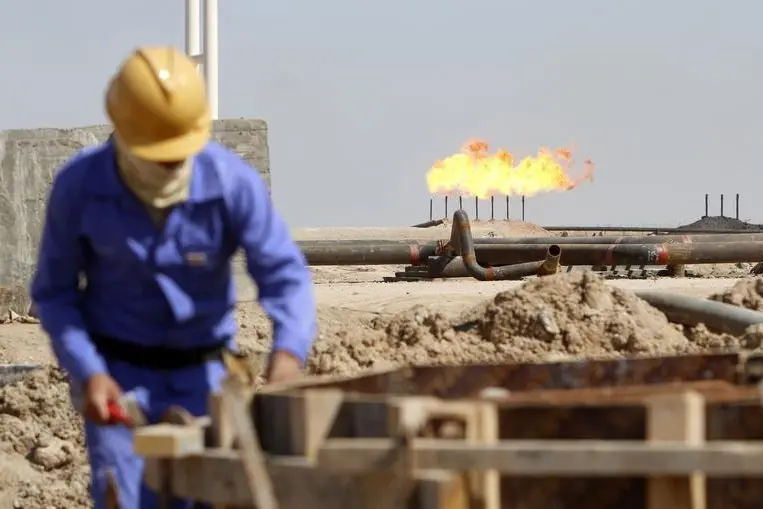PHOTO
* Exports slip from southern and northern ports so far in June
* Iran displaces Iraq as OPEC's biggest source of supply growth
* Iraq's overall shipments 3.62 million bpd, below record
By Alex Lawler
LONDON, June 29 (Reuters) - Iraq's oil exports are set to decline in June for a second month, according to loading data and an industry source, adding to signs that supply growth from OPEC's second-largest producer is slowing this year.
Iraq in 2015 provided the biggest rise in supply from the Organization of the Petroleum Exporting Countries. But companies working in Iraq have warned the government that projects to boost output will be delayed if Baghdad cuts spending in response to low oil prices.
Iraq's southern exports in the first 29 days of June have averaged 3.14 million barrels per day (bpd), according to loading data tracked by Reuters and an industry source. That would be down 60,000 bpd from May and sharply lower than the 3.47 million bpd initially expected this month.
"At some point, we are going to see the growth curve flatten out, but it is too early to say if this is happening now," said Samuel Ciszuk, principal oil market adviser at the Swedish Energy Agency.
"There might be several issues affecting Iraqi exports - technical constraints, slower production growth and possibly some competition in the market from Iran."
The head of Iraq's state-owned South Oil Company, speaking to Reuters on Sunday, gave similar exports figures and said the decline was due to maintenance work and as higher domestic demand limits the volume available for export.
Iraqi officials could not immediately be reached for further comment on Wednesday.
The south pumps most of Iraq's oil. Iraq also exports smaller amounts of crude from the north by pipeline to Turkey.
Northern shipments of crude from fields in the semi-autonomous Kurdistan region have fallen to 480,000 bpd so far in June, according to loading data, from 510,000 bpd in May.
The shipments were running at 600,000 bpd at the start of the year but have slowed due to pipeline sabotage and a decision by the central government in Baghdad to suspend pumping Kirkuk crude into the line.
Iraq last year boosted production by more than 500,000 bpd, surprising industry observers, despite spending cuts by companies working at the southern fields and conflict with Islamic State militants.
Iraqi officials still expect further growth in the country's exports this year, but at a slower rate than 2015.
This year, Iran has provided OPEC's largest supply boost as it recovers from Western sanctions that were lifted in January.
(Editing by William Hardy) ((alex.lawler@thomsonreuters.com; +44 207 542 4087; Reuters Messaging: alex.lawler.reuters.com@reuters.net))
* Iran displaces Iraq as OPEC's biggest source of supply growth
* Iraq's overall shipments 3.62 million bpd, below record
By Alex Lawler
LONDON, June 29 (Reuters) - Iraq's oil exports are set to decline in June for a second month, according to loading data and an industry source, adding to signs that supply growth from OPEC's second-largest producer is slowing this year.
Iraq in 2015 provided the biggest rise in supply from the Organization of the Petroleum Exporting Countries. But companies working in Iraq have warned the government that projects to boost output will be delayed if Baghdad cuts spending in response to low oil prices.
Iraq's southern exports in the first 29 days of June have averaged 3.14 million barrels per day (bpd), according to loading data tracked by Reuters and an industry source. That would be down 60,000 bpd from May and sharply lower than the 3.47 million bpd initially expected this month.
"At some point, we are going to see the growth curve flatten out, but it is too early to say if this is happening now," said Samuel Ciszuk, principal oil market adviser at the Swedish Energy Agency.
"There might be several issues affecting Iraqi exports - technical constraints, slower production growth and possibly some competition in the market from Iran."
The head of Iraq's state-owned South Oil Company, speaking to Reuters on Sunday, gave similar exports figures and said the decline was due to maintenance work and as higher domestic demand limits the volume available for export.
Iraqi officials could not immediately be reached for further comment on Wednesday.
The south pumps most of Iraq's oil. Iraq also exports smaller amounts of crude from the north by pipeline to Turkey.
Northern shipments of crude from fields in the semi-autonomous Kurdistan region have fallen to 480,000 bpd so far in June, according to loading data, from 510,000 bpd in May.
The shipments were running at 600,000 bpd at the start of the year but have slowed due to pipeline sabotage and a decision by the central government in Baghdad to suspend pumping Kirkuk crude into the line.
Iraq last year boosted production by more than 500,000 bpd, surprising industry observers, despite spending cuts by companies working at the southern fields and conflict with Islamic State militants.
Iraqi officials still expect further growth in the country's exports this year, but at a slower rate than 2015.
This year, Iran has provided OPEC's largest supply boost as it recovers from Western sanctions that were lifted in January.
(Editing by William Hardy) ((alex.lawler@thomsonreuters.com; +44 207 542 4087; Reuters Messaging: alex.lawler.reuters.com@reuters.net))





















